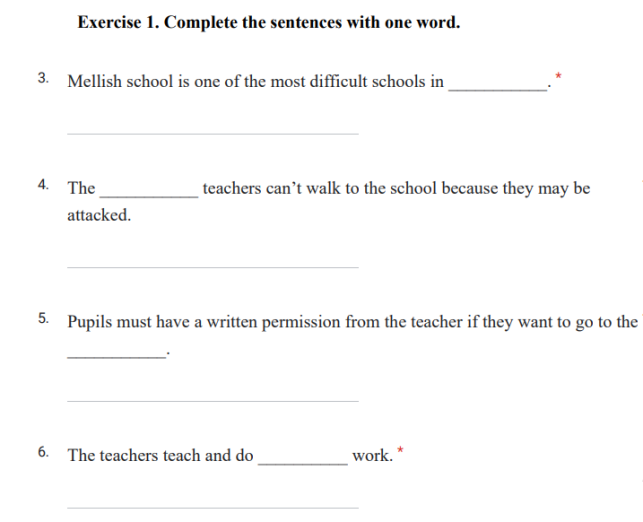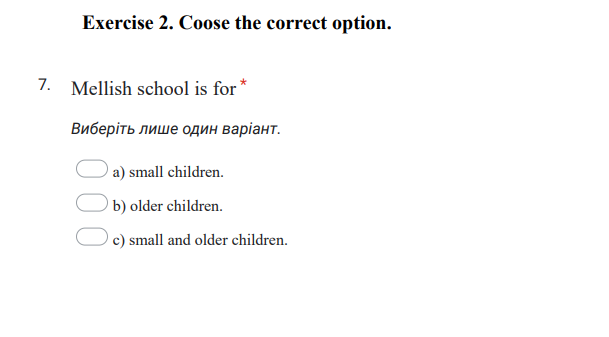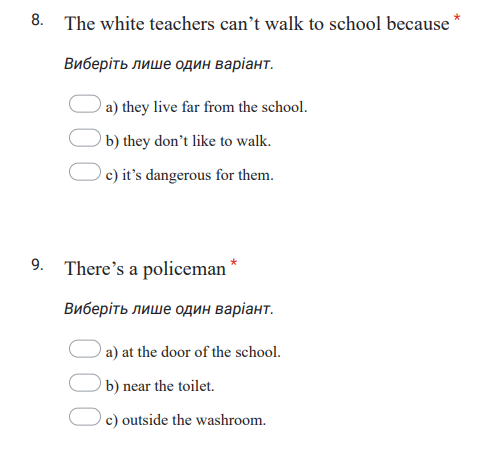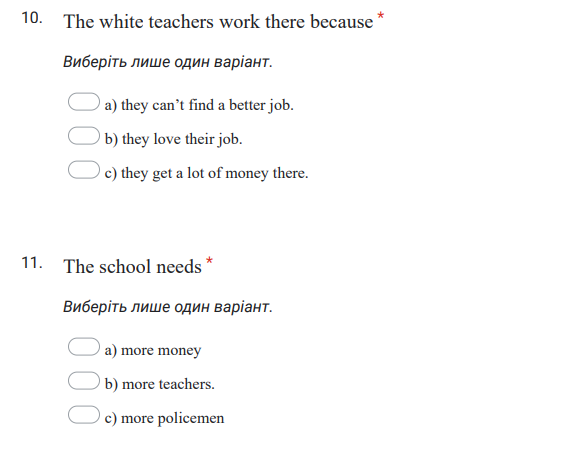олімпіада «Крижанівський ліцей» (Осінь 2023)
- READING
Mellish school is in the slums of Brooklyn for pupils between twelve and fifteen years of age. There are about 1500 pupils there, and 90 teachers. It’s a problem school, perhaps one of the most difficult schools in America. The white teachers can’t walk to the school because they may be attacked. They all drive to school, and their cars have special locks.
There’s always a black policeman at the door of the school. He has a radio contact with the school guards. Pupils must have a written permission from the teacher if they want to go to the toilet. There’s a guard outside the washroom. Only one child can go into the washroom at a time, and he can’t stay there long. The children who live in that district go to school that. They are all black children.
However, why do the teachers work there? “It’s very hard of course,” Jane says Flinch, a forty – five-year-old teacher. Most children have problems at home. Some of them are beaten by their parents. Some of them sleep at the lessons because they had to work at night. Some of the children get sick at the lessons because they didn’t have breakfast or even a meal for a day or two.
It’s the love of the job that keeps the teachers in that school. They teach and do social work. They feel that they are doing something good for the children who need help. “There’s also the problem of violence,” says one of the teachers. “Sometimes when I go into a class, I can feel that some of the children are like a dynamite. However, I feel quite safe. I am sure that other pupils will help me.” There is very little money for teaching in that school. There is no money to buy food for the children. The principal of the school has been there for many years. A lot of his happy optimism has gone.
“No, i’m not optimistic about the future. Look around you,” he says and points out of the window at the high wall round the school. “It’s not a very bright sight: buildings have holes instead of the windows, shops are closed, groups of people are sitting on the steps of the houses. They have nowhere to go and nothing to do.” “We need money,” he says, “money is the only way to help this school and these people, and, of course, jobs for the people.”




- WRITING
![]()

- SPEAKING

- LISTENING
Audio Clip: Narrator: Meet Sarah, a 17-year-old aspiring gymnast who dreams of competing in the Olympics one day. She trains tirelessly, balancing school and long hours at the gym. Let's listen to her story.
Sarah: (enthusiastic tone) Ever since I was a little girl, I've been passionate about gymnastics. The grace and power of the sport have always fascinated me. I watch the Olympics religiously, and I've always dreamed of standing on that podium one day.
Narrator: (narrating) Sarah practices her routines for hours every day, aiming for perfection in every move. She has a dedicated coach who believes in her talent.
Coach Emily: (supportive tone) Sarah is an incredible young athlete. She's focused, disciplined, and has the determination to make it to the Olympics.
Narrator: (narrating) However, the road to the Olympics is not easy. Sarah faces numerous challenges.
Sarah: (determined tone) Balancing school and training is tough. I often have to study late into the night. But this is the sacrifice I'm willing to make to reach my Olympic dream.
Questions:
What is Sarah's dream?
a. To become a world-famous actress
b. To compete in the Olympics
c. To travel the world
What fascinates Sarah about gymnastics?
a. The balance of school and sports
b. The grace and power of the sport c.
The thrill of competing
How does Sarah's coach, Emily, describe her?
a. As a talented artist
b. As a focused and disciplined athlete
c. As an aspiring musician
What challenges does Sarah face in pursuing her Olympic dream?
a. Finding a good coach
b. Balancing school and training
c. Winning a gold medal


про публікацію авторської розробки
Додати розробку
